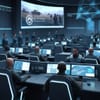Artificial intelligence is revolutionizing the landscape of modern warfare, transforming military operations in profound ways. AI's ability to analyze vast amounts of data in real-time enables military commanders to make informed decisions quickly. Autonomous systems, such as AI-powered drones and robots, can operate independently, reducing the need for human intervention in high-risk situations.
Moreover, AI's predictive analytics capabilities allow militaries to anticipate and respond to threats more effectively. However, the integration of AI in warfare also raises important concerns about accountability, bias, and cybersecurity risks.
The ongoing conflict between Ukraine and Russia has already seen the use of AI-powered drones and autonomous systems, highlighting the potential benefits and risks of these technologies. As AI continues to reshape the nature of warfare, it's likely to lead to a new era of military competition, with nations vying to develop the most advanced systems.
The development and use of AI in warfare necessitate international frameworks to regulate these technologies, ensuring they are used responsibly and with accountability. The future of warfare will likely be characterized by battles fought not just by soldiers but also by machines and algorithms, fundamentally changing the nature of conflict.


